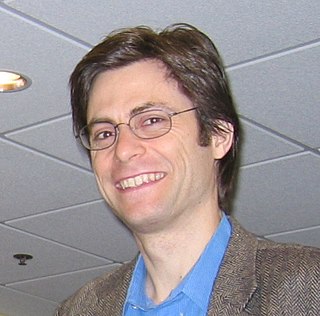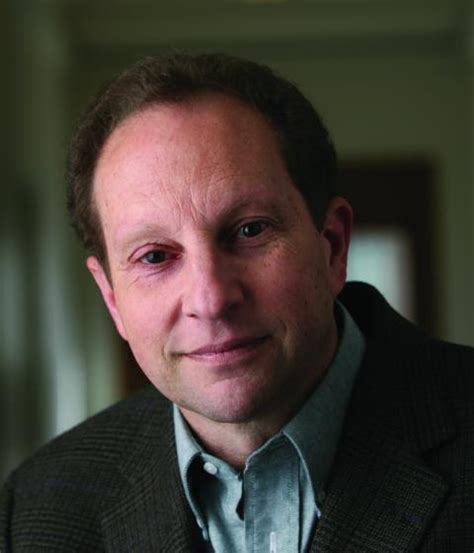A Quote by Brian Cox
The story of the universe finally comes to an end. For the first time in its life, the universe will be permanent and unchanging. Entropy finally stops increasing because the cosmos cannot get any more disordered. Nothing happens, and it keeps not happening, forever. It's what's known as the heat-death of the universe. An era when the cosmos will remain vast and cold and desolate for the rest of time the arrow of time has simply ceased to exist. It's an inescapable fact of the universe written into the fundamental laws of physics, the entire cosmos will die.
Quote Topics
Any
Arrow
Because
Cannot
Cold
Cosmos
Death
Desolate
Die
End
Entire
Entropy
Era
Exist
Fact
Finally
First
First Time
Forever
Fundamental
Get
Happening
Happens
Heat
Increasing
Inescapable
Keeps
Known
Laws
Laws Of Physics
Life
More
Nothing
Permanent
Physics
Remain
Rest
Simply
Stops
Story
Time
Unchanging
Universe
Vast
Will
Written
Related Quotes
A scenario is suggested by which the universe and its laws could have arisen naturally from nothing. Current cosmology suggests that no laws of physics were violated in bringing the universe into existence. The laws of physics themselves are shown to correspond to what one would expect if the universe appeared from nothing. There is something rather than nothing because something is more stable.
A successful unification of quantum theory and relativity would necessarily be a theory of the universe as a whole. It would tell us, as Aristotle and Newton did before, what space and time are, what the cosmos is, what things are made of, and what kind of laws those things obey. Such a theory will bring about a radical shift - a revolution - in our understanding of what nature is. It must also have wide repercussions, and will likely bring about, or contribute to, a shift in our understanding of ourselves and our relationship to the rest of the universe.
This brief century of ours is arguably the most significant one in the history of our universe. We'll have the technology either to self-destruct, or [to] seed our cosmos with life. The situation is so unstable that I doubt we can dwell at this fork in the road for more than another hundred years. But if we end up going the life route instead of the death route, then in a distant future our cosmos will be teaming with life, all of which can be traced back to what we do-here and now. I don't know how we'll be thought of, but I'm sure that we won't be remembered as insignificant.
Trillions of years into the future, when all stars are gone...all parts of the cosmos will cool to the same temperature as the ever-cooling background. At that time, space travel will no longer provide refuge because even Hell will have frozen over. We may then declare that the universe has died-not with a bang, but with a whimper.
Those afraid of the universe as it really is, those who pretend to nonexistent knowledge and envision a Cosmos centered on human beings will prefer the fleeting comforts of superstition. They avoid rather than confront the world. But those with the courage to explore the weave and structure of the Cosmos, even where it differs profoundly from their wishes and prejudices, will penetrate its deepest mysteries.
There is no Christian Gospel if history simply unwinds into a meaningless puddle, if the cosmos simply escapes into a cataclysmic black hole, or if the universe finally dies of exhausted energy. Without belief in a biblical eschatology, there is no Christian hope. Without a sense of perfect moral judgment in the end, the human heart is homeless.
We are living in an inspiring and unimaginably large universe. Contemplating the immensity of our cosmos can make you feel very small and insignificant. But think about it. You have 37.2 trillion cells in your body. There is vastness outside you and vastness inside you. You are connected to this mystery, you are a microcosm of the universe, and every aspect of your life benefits from the universe's provision.
When I talk to audiences about the size and age of the cosmos, people often say, "It makes me feel so insignificant." I answer, "The bigger and more impersonal the universe is, the more meaningful you are, because this vast, impersonal place needs something significant to fill it up." We've abandoned the old belief that humanity is at the physical center of the universe but more come back to believing we are at the center of meaning.
We are all connected to each other biologically, to the earth chemically and to the rest of the universe atomically. That's kinda cool! That makes me smile and I actually feel quite large at the end of that. It's not that we are better than the universe, we are part of the universe. We are in the universe and the universe is in us.
Judaism calls for us to honor the rhythm of human life, the demands of the human community around us, the call of the divine order as the filter and scale for the decisions that drive our own small lives. We do not rule the universe, Judaism reminds us. God does. We are not its standard or its norms. We are only its keepers, its agents, its stewards. To do right by the universe at large is the measure of a happiness framed with the entire cosmos in mind but lived in microcosms across time.


































